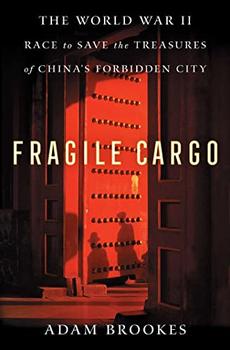Summary | Excerpt | Reviews | Beyond the Book | Readalikes | Genres & Themes | Author Bio

The World War II Race to Save the Treasures of China's Forbidden City
by Adam Brookes
Such masterpieces arrive in the Forbidden City by many different routes. Over preceding centuries Qianlong's predecessors built their own collections, some of whose works survived dynastic collapse and war and have been passed down to him. Many works come to Qianlong as tribute from far-flung regions of the empire or as gifts from officials and nobles seeking favor. Others are commissioned; the imperial painting academy, kilns, and workshops are busy producing objects to the exacting specifications of the imperial household and the emperor himself. Over Qianlong's sixty-year reign, the imperial collections will grow into a vast amalgam of more than a million objects. Qianlong's taste shapes the collections and will influence the sense of succeeding generations as to what constitutes the art of China.
The antiquities and objects brought before the emperor this January afternoon are for him alone. Secrecy and hiddenness are crucial components of the imperial mystique, and the imperial collections, like the Forbidden City itself, are a secret to all but the emperor's household and the court. They are never displayed to the public. Large parts of the collections remain locked away in storage, their riches invisible even to the inhabitants of the Forbidden City. These are not collections in the way a European art collector might understand the word. Many objects are not decorative but functional. Fine porcelain from the imperial kilns might be used at the altar of an elaborate Confucian or Buddhist ritual, ancient bronze bells for sacred music. Calligraphy provides moral and aesthetic example. Painting depicts the universe and acquaints the emperor with his subjects. Bronze vessels bear inscriptions dating from deep antiquity that contain philosophical or metaphysical significance. The collections are tightly entwined with the majesty and legitimacy of the emperor's rule. Qianlong, sitting in the Room of the Three Rarities as evening falls, does not conceive of himself as viewing what we think of as "fine art." He sees in these objects the physical manifestation of a higher cosmic order, their beauty and complexity nourishing and strengthening his sense of his own centrality to the universe. In the stroke of the brush, in the fall of light on worked jade, Qianlong discerns the shape of time, the pulse of power.
At 8 p.m. Qianlong retires to his sleeping quarters, his day at an end. He will rule for another thirty years. The Qing empire will never again attain the stability and grandeur of his reign.
Within a few decades of Qianlong's death in 1799, the Qing empire falls into its long decline, weakened from within by rebellion, battered from without by war with Britain and other colonial powers. Invaders instinctively grasp the symbolic power of the imperial palaces and the priceless, fragile collections hidden within them. In 1860 British and French troops loot the Summer Palace just to the west of Peking, stuffing their backpacks with jade and jewels and smashing the porcelain on the flagstones before the British set the buildings on fire. A British officer, Captain J. H. Dunne of the 99th Regiment of Foot, finds a litter of Pekingese puppies in the ruins and takes one all the way back to England to present to Queen Victoria. The dog becomes a royal favorite. Its name: Looty.
In 1900 the British and French soldiers are back, with Americans, Japanese, Russians and Germans, Italians and Austro-Hungarians this time, to inflict multinational punishment on the Qing court for its support of the Boxer uprising. The Boxers—bands of impoverished, marginalized men afire with xenophobic, mystical millenarianism—murder foreigners and Chinese who associate with them, and have laid siege to the foreign legations in Peking. The foreign army marches on Peking, relieves the legations, and loots the city in a welter of murder and rape. Soldiers force their way deep into the Forbidden City, sending terrified eunuchs and concubines fleeing through the courtyards and passageways. For the troops, Peking and its palaces are the stuff of Victorian dreams, treasure houses of a corrupt and decaying imperium ripe for plunder. British regiments hold "prize auctions" to sell off and profit from their loot. Shrewd collectors pick up masterpieces for a pittance. One American diplomat needs an entire railway car to haul away his gains. Some of the loot will end up in museums and private collections across Europe, America, and Japan.
Excerpted from Fragile Cargo by Adam Brookes. Copyright © 2023 by Adam Brookes. Excerpted by permission of Atria Books. All rights reserved. No part of this excerpt may be reproduced or reprinted without permission in writing from the publisher.




When a true genius appears in the world, you may know him by this sign...
Click Here to find out who said this, as well as discovering other famous literary quotes!
Your guide toexceptional books
BookBrowse seeks out and recommends the best in contemporary fiction and nonfiction—books that not only engage and entertain but also deepen our understanding of ourselves and the world around us.